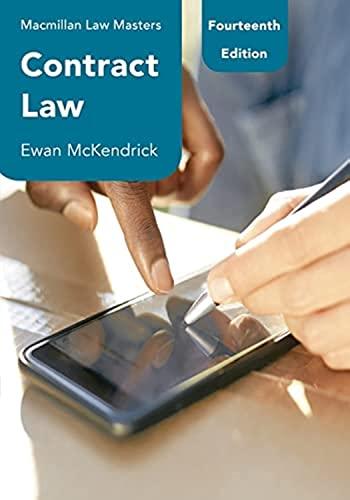Question
A, B, C and D allegedly rob a Town Bank, which is located in the city of Cape Town. Members of the South African Police
A, B, C and D allegedly rob a Town Bank, which is located in the city of Cape Town. Members of the South African Police Services (SAPS) are called to the scene of the crime, during which a shoot-out ensues between police and the robbers. Two of the robbers, A and B manage to escape with an undisclosed amount of the loot. C who is holed up inside the bank, is arrested by Sgt. F, whilst trying to walk out through the main door of the bank. D (who is unarmed) is ordered by Capt. G to surrender. D declines the order, and instead runs away in the opposite direction. H, a client of the bank (and, a civilian), who just happened to be present on the scene, produces his licenced firearm and fires a shot into D's back, critically wounding him. H arrests D and hands him over to G for detention. An R4 Rifle which was allegedly used by the assailants is found abandoned on the floor of the bank.
3.1 During the subsequent trial, M, the presiding officer, informs the prosecution and the defence that she is, in fact, dominis litis in the case, and that she will "control the proceedings, as mandated by law". Discuss M's assertions in the light of the following aspects: (a) The name/ designation of the court regime which is followed in South African legal practice as it relates to the role of the parties to the proceedings; and (1) (b) The role of the presiding officer in South African criminal justice proceedings as opposed to that of the presiding officer in the European or Continental System. (12)
3.2 "In terms of s 35(1)(d)(i), everyone who is arrested for allegedly committing an offence has the right to be brought before a court as soon as reasonably possible, but not later than 48 hours after the arrest". D, who was shot and injured by H during the robbery is, in the meantime in hospital under police guard. He is made to appear in court ten weeks after the robbery. Upon his first appearance in court, D instructs his attorney L, to apply for the case to be 'struck of the roll' on the grounds that his Constitutional right to appear before court within 48 hours has been violated. Discuss the merits of D's contention. (12)
3.3) A and B are subsequently arrested a few weeks after the robbery. A, B, C and D apply for bail. The prosecutor, Ms. PP, argues, during the bail proceedings, that the accused will be charged, in the subsequent criminal trial, with robbery with aggravating circumstances. The accused contend, on the other hand, that the State does not have a strong case against them, and that "the interests of justice" justify their release on bail. During the bail application, Ms.PP, is adamant that the accused must not be granted bail. She further contends before court, that
(a) the crime of robbery with aggravating circumstances is classified under Schedule 5 of the Criminal Procedure Act; and (1) (b) the prosecution must discharge its onus beyond any reasonable doubt; (2)
(c) in terms of section 60(11)(a) the prosecution bears the onus to prove to the court beyond any reasonable doubt that "substantial and compelling" circumstances exist which justify release on bail (2)
Discuss the accuracy or otherwise dynamics of the aspects referred to in (a), (b) and (c).
Step by Step Solution
There are 3 Steps involved in it
Step: 1

Get Instant Access to Expert-Tailored Solutions
See step-by-step solutions with expert insights and AI powered tools for academic success
Step: 2

Step: 3

Ace Your Homework with AI
Get the answers you need in no time with our AI-driven, step-by-step assistance
Get Started


